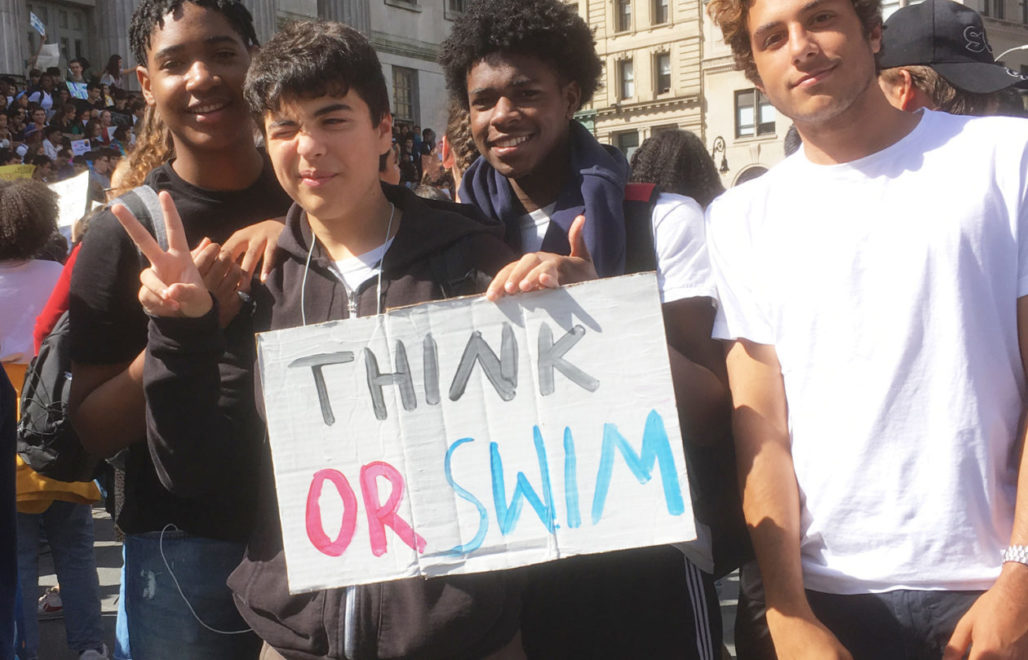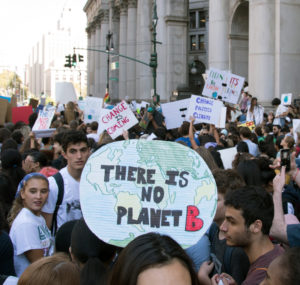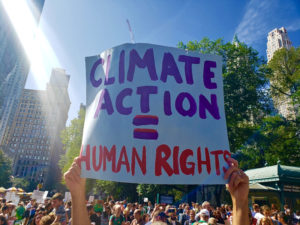CODE BLUE: Your Role in Saving A System in Peril

Even before I attended a Climate Reality Leadership Corps training with Al Gore this summer, I was a proud environmental proselytizer. I closed the doors of megastores spewing their air conditioning onto the streets. I threatened to report cars idling more than three minutes to the New York City Department of Environmental Protection. I scoffed when my friends bought a new car that was neither hybrid nor electric. What are these people thinking? I sneered. And then one day I realized the obvious: That’s just it. They’re not thinking. Their everyday actions don’t factor in a climate system in peril. Detachment in the face of a crisis is an attitude I’ve had some experience with.
When my daughter was fifteen, she started eating voraciously, and yet began losing weight. She’d eat a large dinner, then half an hour later, assemble another meal from the leftovers in the fridge. She couldn’t get through an entire high school class without leaving the room either to take water in or to pass it out. We drink a lot of water on my side of the family, I’d tell myself one day. Growth spurts are common at this age, I’d say on another. At a movie theater one night, my daughter drank her water bottle, my water bottle, and then got up to refill at the water fountain in case she got thirsty. Woah, this is weird, I thought. But still I took no action. It took her friend’s mother who is a nurse rapping loudly on my door and admonishing me: “Your daughter has the classic symptoms of Type 1 diabetes and must be tested immediately.” Only then did I jump on it.
One day I realized the obvious: That’s just it. They’re not thinking. Their everyday actions don’t factor in a climate system in peril.
This was my experience watching one body’s system get disrupted. We are now watching an entire planet’s system do the same. Consider this the loud rapping and the stern voice of a nurse telling you to jump on it. Evidence of the earth’s unsustainable disequilibrium is everywhere. On August 6, Minneapolis had a hailstorm that dropped tennis ball sized chunks of ice.[1]That same day, the monsoons in 8 cities in India resulted in 531 people dead and 655,000 displaced.[2]The week before, there were record breaking heat waves in Japan and Europe; in fact, July 2019 is the record holder for the hottest month on Earth ever recorded.[3]Should it surprise us that seventeen countries, home to a fourth of the earth’s population, are close to hitting Day Zero–the day when their water supply will be completely depleted? [4]
How did we get here? It’s the old elementary school story of the water cycle with some very significant shifts. In a state of equilibrium, some of the sun’s rays warm the earth and others get reflected back into space as infrared rays. But in our current state of disequilibrium–with an atmosphere that’s oversaturated with carbon dioxide–the infrared solar radiation gets trapped inside the earth’s atmosphere, causing the planet to heat up. The poles of the planet warm at a faster rate than the area around the equator does. As the ice at the poles melts, there is less reflective surface for the sun’s rays to bouce off of, and so even more infrared radiation gets absorbed. 93 percent of the heat trapped in our atmosphere goes into the oceans. Warmer oceans disturb the usual jet streams. This change in wind flow combined with the capacity of warm water to keep a storm aloft creates hurricanes of longer duration. The rainfall associated with these events tends to be of greater intensity as well.
 Just as heat is rising off the oceans, it is also rising off the land. This causes different kinds of peril to human life. Dryness makes the deciduous biomes conducive to forest fires. The increased heat dries up soil and local water sources in other habitats as well. Aridity leads to food scarcity. And without enough food in their homeland, people migrate in search of more hospitable surroundings. In short order, our environmental crisis becomes a humanitarian crisis.
Just as heat is rising off the oceans, it is also rising off the land. This causes different kinds of peril to human life. Dryness makes the deciduous biomes conducive to forest fires. The increased heat dries up soil and local water sources in other habitats as well. Aridity leads to food scarcity. And without enough food in their homeland, people migrate in search of more hospitable surroundings. In short order, our environmental crisis becomes a humanitarian crisis.
Some people claim it’s hard to prove that these weather changes are caused by manmade global warming. And they’re right that we can’t determine the precise cause of any single event–say, an unprecedented scorching in May. But scientists are in the business of noticing and analyzing patterns, and they’re alarmed by the currect weather patterns. Dr. Tracy Twine of the University of Minnesota draws an analogy to steroids in the baseball industry. No, you can’t prove that any single home run hit was fueled by steroids. But you can certainly look at the accumulated data for the number of homeruns hit in the ‘90’s when steroid use was rampant. The number of players who hit over 40 homeruns in a season in the ‘90’s was significantly larger than it was in either the period before the steroid era or after steroids were banned.[5]Using statistics in this way, climatologists can assert with a high degree of probablility that increased heat causes the earth’s climate system to be out of whack.
In the case of Type 1 diabetes, the treatment plan is non-negotiable. Would I like my daughter to survive, or not? That’s the question we should be asking about our planet as well. There isn’t one single treatment plan to stem climate change. But there are multiple organizations that have done extensive research to guide us in the choices we must make to mitigate the effects of global warming. It is up to each and every one of us to educate ourselves and to adjust our lifestyles.
Many people taking the same action simultaneously can produce an effect.
Even in my New York cohort at the 42nd Climate Reality Leadership Corps training, there was a man who claimed there was nothing we could do in our private lives to combat climate change. Big companies are the culprits, and China is a far bigger polluter than the U.S.[6]Both points are true, but I maintain that the reason the climate crisis feels so remote and scary to upriver first world citizens is that we have the sense we can do nothing about it. For psychological well-being, it’s critical to take action. And many people taking the same action simultaneously can produce an effect. Further, when the climate crisis enters the personal realm, I believe it will spur people to donate to alternative energy initiatives and to lobby local and state representatives to adopt policies that stem global warming. In other words, we’ll be motivated to take the actions that have wider-reaching repurcussions.
So what are the lifestyle changes I’m advocating?
(1) Buy an electric or hybrid car. At this point in the US, the biggest emitter of fossil fuels is no longer energy production. That’s because the adoption of wind and solar power is making a difference. What’s the single biggest contributor to greenhouse gas emissions in the US today? Gas powered vehicles.[7]
(2) Cut down on air travel. You don’t have to take a sailing ship, as Greta Thunberg did to get to the September 2019 UN climate talks,[8]but many of us could easily curtail our international travel. Air travel has an enormous carbon footprint: one round trip cross-country airline trip produces the equivalent of one fifth of the greenhouse gases emitted by the average car in a year.[9]
(3) Eat less meat. As we’ve all heard, cow burps contain methane which is the greenhouse gas that’s next in line behind carbon dioxide in our atmosphere.[10]Another concern is that it takes seven pounds of plant protein to produce just one pound of beef protein.[11]Besides the problem of methane emission, think of the energy, land use, and water required required to produce that meat.
(4) Elect a president who not only believes there’s a climate crisis, but is committed to working with other countries to reduce fossil fuel emissions. Fire this president before we go down in flames.
Want to dive in deeper?
Check out:
- Project Drawdown:
- The Better World Shopping Guide:
https://betterworldshopper.org/
- The New York Times Climate Forward newsletter: https://www.nytimes.com/column/climate-fwd
Attend:
- Climate Reality Leadership Corps training with Al Gore: https://www.climaterealityproject.org/training
CITATIONS
[1]https://www.washingtonpost.com/weather/2019/08/06/we-got-pounded-huge-hail-strikes-minneapolis-suburb-out-blue
[3]https://www.washingtonpost.com/climate-environment/2019/08/05/heres-how-hottest-month-recorded-history-unfolded-around-globe/
[4]https://www.nytimes.com/interactive/2019/08/06/climate/world-water-stress.html
[5]https://www.omicsonline.org/open-access/the-effect-of-the-steroid-era-on-major-league-baseball-hitters-did-it-enhance-hitting-2161-0673-1000161.php?aid=53354
[6]https://www.thedailybeast.com/china-worlds-biggest-polluter-hits-carbon-goals12-years-early
[7]https://www.forbes.com/sites/realspin/2017/01/25/heavy-transportation-is-now-the-biggest-polluter/#6ad689071a19
[8]https://www.washingtonpost.com/world/2019/08/15/swedish-climate-activist-greta-thunberg-is-sailing-america-amid-storm-criticism/
[9]https://www.nytimes.com/2017/07/27/climate/airplane-pollution-global-warming.html
[10]https://www.reuters.com/article/us-global-livestock-emissions/fighting-global-warming-one-cow-belch-at-a-time-idUSKBN1K91CU
[11]https://stanfordmag.org/contents/can-vegetarianism-save-the-world-nitty-gritty

